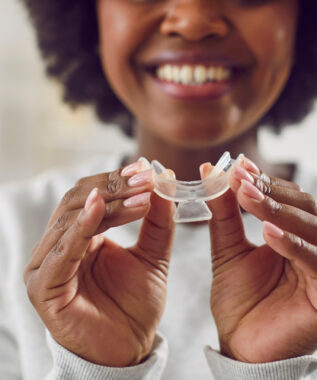Treatment for Teeth-Grinding and Jaw Dysfunction

For some patients, the greatest threats to their smiles aren’t plaque and tartar; it’s a dysfunction in their bite that can lead to things like excessive tooth wear, damage to their jaw joints, and more. Specifically, bruxism (teeth-grinding) and TMJ disorder (jaw joints dysfunction) are common bite conditions that many patients require customized dental treatment to address. If you exhibit signs of wear or damage to your teeth that’s consistent with bruxism, or if your teeth show signs of diminished bite function, then bruxism or TMJ treatment may help you restore your smile.
What are bruxism and TMJ disorder?
Bruxism is the formal name for chronic teeth-grinding, which can be caused by a variety of different factors. If you have bruxism, you can’t control when or how forcefully you grind your teeth, and in many cases, it can occur most frequently at night. Before long, the constant pressure and friction can wear your teeth down, making them weaker and more vulnerable to decay and damage. TMJ (temporomandibular joint) disorder is commonly associated with bruxism, and describes damage to one or both of your jaw’s joints. If you have TMJ disorder, you may have increasingly more trouble biting and chewing comfortably, experience chronic pain in your jaw and face, and suffer from popping and clicking sensations when you open and close your bite.
What does a custom appliance do to treat it?
After you’ve been diagnosed with bruxism and/or TMJ disorder, treatment will depend on the exact nature and extent of your condition. In many cases, however, one or both conditions can be effectively treated with the help of a custom-designed oral appliance. A custom appliance can protect your teeth from each other while you sleep, eliminating the risks of nighttime teeth-grinding. It may also help support your lower jaw in a way that allows your TMJs to rest and heal. Alleviating the pressure on your jaw joints can reduce the symptoms of TMJ disorder and help you regain the proper, comfortable function of your bite.
Abfractions
Bruxism often causes dental abfractions, which is when a tooth develops a notch in it right above the gum line. When patients grind their teeth, extreme pressure is placed on them at the gum line. This causes a tooth to over flex and creates a notch, also called a lesion, in it. Other causes include malocclusion (improper bite), acid erosion, and brushing too hard. Abfractions are often treated like cavities, with a dental filling used to fill in the notch. A mouthguard may also be recommended.
Call us to learn about bruxism & TMJ treatment
Bruxism and TMJ disorder can become serious threats to your oral health, though a customized appliance may help you treat your condition and mitigate the threat. To schedule a consultation with us, call Dreem Dentistry in Leawood, KS, today at 913-681-5500. We also serve patients who live in Overland Park, South KC, South OP, Martin City, MO, and all surrounding communities.






